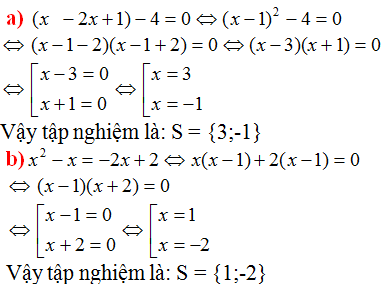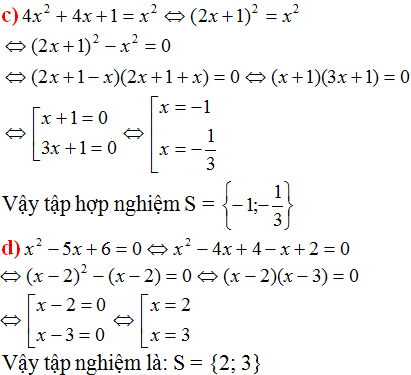Hãy nhập câu hỏi của bạn vào đây, nếu là tài khoản VIP, bạn sẽ được ưu tiên trả lời.

Mình không hiểu đề bài cho lắm bạn có thể ghi lại đề không ??
Lưu ý: kí hiệu này là mũ ( ^ ) nha

a) Ta thấy x - 1 \(\ne\)0 vì x = 1 không nghiệm đúng phương trình
Nhân hai vế của phương trình với x - 1 \(\ne\)0 ta được x5 -1 = 0 hay x = 1 ,không thỏa mãn điều kiện trên .
Vậy phương trình vô nghiệm .
b) Ta có : \(\frac{\left(x-2\right)^2}{3}-\frac{\left(2.x-3\right).\left(2.x+3\right)}{8}+\frac{\left(x-4\right)^2}{6}\)
<=> 3.(x-2)2 - 3. ( 2.x - 3 ) . ( 2.x + 3 )+ 4. ( x-4 )2 = 0
<=> 3. ( x - 4.x + 4 ) - 3. ( 4.x2 -9 ) + 4. ( x2 -8.x + 16 ) = 0
<=> -5.x2 -44.x + 103 = 0
<=> \(\orbr{\begin{cases}x=\frac{-22+3\sqrt{111}}{5}\\x=\frac{-22-3\sqrt{111}}{5}\end{cases}}\)
Vậy \(\orbr{\begin{cases}x=\frac{-22+3\sqrt{111}}{5}\\x=\frac{-22-3\sqrt{111}}{5}\end{cases}}\)
a) Ta thấy x - 1 \(\ne\)0 vì x = 1 không nghiệm đúng phương trình
Nhân hai vế của phương trình với x - 1 \(\ne\)0 ta được x5 -1 = 0 hay x = 1 ,không thỏa mãn điều kiện trên .
Vậy phương trình vô nghiệm .
b) Ta có : \(\frac{\left(x-2\right)^2}{3}-\frac{\left(2.x-3\right).\left(2.x+3\right)}{8}+\frac{\left(x-4\right)^2}{6}\)
<=> 3.(x-2)2 - 3. ( 2.x - 3 ) . ( 2.x + 3 )+ 4. ( x-4 )2 = 0
<=> 3. ( x - 4.x + 4 ) - 3. ( 4.x2 -9 ) + 4. ( x2 -8.x + 16 ) = 0
<=> -5.x2 -44.x + 103 = 0
<=> \(\orbr{\begin{cases}x=\frac{-22+3\sqrt{111}}{5}\\x=\frac{-22-3\sqrt{111}}{5}\end{cases}}\)
Vậy \(\orbr{\begin{cases}x=\frac{-22+3\sqrt{111}}{5}\\x=\frac{-22-3\sqrt{111}}{5}\end{cases}}\)

(x2 + x + 1)(6 - 2x) = 0
<=> 6 - 2x = 0 (do x2 + x + 1 > 0)
<=> 2x = 6
<=> x = 3
Vậy S = {3}
(8x - 4)(x2 + 2x + 2) = 0
<=> 8x - 4 = 0 (vì x2 + 2x + 2 > 0)
<=> 8x = 4
<=> x = 1/2
Vậy S = {1/2}
x3 - 7x + 6 = 0
<=> x3 - x - 6x + 6 = 0
<=> x(x2 - 1) - 6(x - 1) = 0
<=> x(x - 1)(x + 1) - 6(x - 1) = 0
<=> (x2 + x - 6)(x - 1) = 0
<=> (x2 + 3x - 2x - 6)(x - 1) = 0
<=> (x + 3)(x - 2)(x - 1) = 0
<=> x + 3 = 0
hoặc x - 2 = 0
hoặc x - 1 = 0
<=> x = -3
hoặc x = 2
hoặc x = 1
Vậy S = {-3; 1; 2}
x5 - 5x3 + 4x = 0
<=> x(x4 - 5x2 + 4) = 0
<=> x(x4 - x2 - 4x2 + 4) = 0
<=> x[x2(x2 - 1) - 4(x2 - 1)] = 0
<=> x(x - 2)(x + 2)(x - 1)(x + 1) = 0
<=> x = 0 hoặc x - 2 = 0 hoặc x + 2 = 0 hoặc x - 1 = 0 hoặc x + 1 = 0
<=> x = 0 hoặc x = 2 hoặc x = -2 hoặc x = 1 hoặc x = -1
Vậy S = {-2; -1; 0; 1; 2}
+ Ta có: \(\left(x^2+x+1\right).\left(6-2x\right)=0\)
- Ta lại có: \(x^2+x+1=\left(x^2+x+\frac{1}{4}\right)+\frac{3}{4}=\left(x+\frac{1}{2}\right)^2+\frac{3}{4}\ge\frac{3}{4}>0\forall x\)
- Vì \(x^2+x+1>0\forall x\)mà \(\left(x^2+x+1\right).\left(6-2x\right)=0\)
\(\Rightarrow6-2x=0\Leftrightarrow-2x=-6\Leftrightarrow x=3\left(TM\right)\)
Vậy \(S=\left\{3\right\}\)
+ Ta có: \(\left(8x-4\right).\left(x^2+2x+2\right)=0\)
- Ta lại có: \(x^2+2x+2=\left(x^2+2x+1\right)+1=\left(x+1\right)^2+1\ge1>0\forall x\)
- Vì \(x^2+2x+2>0\forall x\)mà \(\left(8x-4\right).\left(x^2+2x+2\right)=0\)
\(\Rightarrow8x-4=0\Leftrightarrow8x=4\Leftrightarrow x=\frac{1}{2}\left(TM\right)\)
Vậy \(S=\left\{\frac{1}{2}\right\}\)
+ Ta có: \(x^3-7x+6=0\)
\(\Leftrightarrow\left(x^3-x^2\right)+\left(x^2-x\right)+\left(6x-6\right)=0\)
\(\Leftrightarrow\left(x-1\right).\left(x^2+x-6\right)=0\)
\(\Leftrightarrow\left(x-1\right).\left[\left(x^2-2x\right)+\left(3x-6\right)\right]=0\)
\(\Leftrightarrow\left(x-1\right).\left(x-2\right).\left(x+3\right)=0\)
Vậy \(S=\left\{-3;1;2\right\}\)
+ Ta có: \(x^5-5x^3+4x=0\)
\(\Leftrightarrow x.\left[\left(x^4-x^2\right)-\left(4x^2-4\right)\right]=0\)
\(\Leftrightarrow x.\left[x^2.\left(x^2-1\right)-4.\left(x^2-1\right)\right]=0\)
\(\Leftrightarrow x.\left(x^2-1\right).\left(x^2-4\right)=0\)
\(\Leftrightarrow x=0\left(TM\right)\)
hoặc \(x^2-1=0\Leftrightarrow x^2=1\Leftrightarrow x=\pm1\left(TM\right)\)
hoặc \(x^2-4=0\Leftrightarrow x^2=4\Leftrightarrow x=\pm2\left(TM\right)\)
Vậy \(S=\left\{-2;-1;0;1;2\right\}\)
!!@@# ^_^ Chúc bạn hok tốt ^_^#@@!!

a)(x2-2x+1)-4=0
⇔(x-1)2-4=0
⇔(x-1-2)(x-1+2)=0
⇔(x-3)(x+1)=0
⇔x-3=0 hoặc x+1=0
1.x-3=0⇔x=3
2.x+1=0⇔x=-1
vậy phương trình có 2 nghiệm:x=3 và x=-1

a) \(x^4-x^3+2x^2-x+1=0\)
\(\Leftrightarrow\left(x^4+x^2\right)-\left(x^3+x\right)+\left(x^2+1\right)=0\)
\(\Leftrightarrow x^2\left(x^2+1\right)-x\left(x^2+1\right)+\left(x^2+1\right)=0\)
\(\Leftrightarrow\left(x^2+1\right)\left(x^2-x+1\right)=0\)
\(\Leftrightarrow\orbr{\begin{cases}x^2+1=0\left(ktm\right)\\x^2-x+1=\left(x-\frac{1}{2}\right)^2+\frac{3}{4}=0\left(ktm\right)\end{cases}}\)
Vậy phương trình vô nghiệm (ĐPCM)
b) \(x^4-2x^3+4x^2-3x+2=0\)
\(\Leftrightarrow\left(x^4-2x^3+x^2\right)+\left(x^2-2x+1\right)+\left(x^2-x+\frac{1}{4}\right)+\left(x^2+\frac{3}{4}\right)=0\)
\(\Leftrightarrow\left(x^2-x\right)^2+\left(x-1\right)^2+\left(x-\frac{1}{2}\right)^2+\left(x^2+\frac{3}{4}\right)=0\)
Có : \(\left(x^2-x\right)^2\ge0\)
\(\left(x-1\right)^2\ge0\)
\(\left(x-\frac{1}{2}\right)^2\ge0\)
\(x^2+\frac{3}{4}\ge\frac{3}{4}\)
\(\Leftrightarrow\left(x^2-x\right)^2+\left(x-1\right)^2+\left(x-\frac{1}{2}\right)^2+\left(x^2+\frac{3}{4}\right)\ge\frac{3}{4}\)
Vậy phương trình vô nghiệm.(ĐPCM)

\(\Leftrightarrow\orbr{\begin{cases}x^2-2x+4=2x+1\\x^2-2x+4=-2x-1\end{cases}}\Leftrightarrow\orbr{\begin{cases}x^2-4x+3=0\\x^2+5=0\left(loai\right)\end{cases}}\)
\(\Leftrightarrow x^2-3x-x+3=0\Leftrightarrow x.\left(x-3\right)-\left(x-3\right)=0\)
\(\Leftrightarrow\left(x-1\right).\left(x-3\right)=0\Leftrightarrow\orbr{\begin{cases}x=3\\x=1\end{cases}}\)

a)\(2+\frac{3}{x-5}=1\)
\(\Rightarrow\frac{3}{x-5}=-1\)
\(\Rightarrow3=-x+5\)
\(\Leftrightarrow x+3=5\)
\(\Rightarrow x=2\)

b, \(\left(4x+2\right)\left(x^2+1\right)=0\)
\(\Leftrightarrow4x+2=0\) (Vì \(x^2+1>0\forall x\))
\(\Leftrightarrow x=\frac{-1}{2}\)
Vậy phương trình có nghiệm \(x=\frac{-1}{2}.\)
c, \(\left(x^2-4\right)+\left(x-2\right)\left(3-2x\right)=0\)
\(\Leftrightarrow\left(x-2\right)\left(x+2+3-2x\right)=0\)
\(\Leftrightarrow\left(x-2\right)\left(5-x\right)=0\)
\(\Leftrightarrow\left[{}\begin{matrix}x-2=0\\5-x=0\end{matrix}\right.\Leftrightarrow\left[{}\begin{matrix}x=2\\x=5\end{matrix}\right.\)
Vậy phương trình có tập nghiệm \(S=\left\{2;5\right\}\).
d, \(3x^2+2x-1=0\)
\(\Leftrightarrow3x^2+3x-x-1=0\)
\(\Leftrightarrow3x\left(x+1\right)-\left(x+1\right)=0\)
\(\Leftrightarrow\left(x+1\right)\left(3x-1\right)=0\)
\(\Leftrightarrow\left[{}\begin{matrix}x+1=0\\3x-1=0\end{matrix}\right.\Leftrightarrow\left[{}\begin{matrix}x=-1\\x=\frac{1}{3}\end{matrix}\right.\)
Vậy phương trình có tập nghiệm \(S=\left\{-1;\frac{1}{3}\right\}\).


Ta có: \(\left(x^2-2x+1\right)-4=0\)
\(\Leftrightarrow\left(x-1\right)^2-2^2=0\)
\(\Leftrightarrow\left(x-1-2\right)\left(x-1+2\right)=0\)
\(\Leftrightarrow\left(x-3\right)\left(x+1\right)=0\)
\(\Leftrightarrow\left[{}\begin{matrix}x-3=0\\x+1=0\end{matrix}\right.\)\(\Leftrightarrow\left[{}\begin{matrix}x=3\\x=-1\end{matrix}\right.\)
Vậy...
Ta có: \(x^2-2x+1-4=0\)
\(\Leftrightarrow\left(x-1\right)^2=4\)
\(\Leftrightarrow\left[{}\begin{matrix}x-1=2\\x-1=-2\end{matrix}\right.\Leftrightarrow\left[{}\begin{matrix}x=3\\x=-1\end{matrix}\right.\)
Vậy: S={3;-1}